Even the drive in towards the mart is uncertain, as the situation concerning the Covid-19 virus seems to change by the hour.
For the most part, farmers are adapting well to the changes, but, at the same, time there was a good proportion of wondering how long marts would remain open.

A sellers eye view of proceedings.
Former Carbery group chair Johnny O'Brien was one of those selling and he urged farmers to support each other where possible at this time.
"The important thing is that everyone supports one another. If marts close, that could cause its own problems from an animal welfare perspective. People need to be careful and look out for one another."
Concern
In the lead-up to the sale, there was a small bit of concern that there would be extra calves at the sale, but numbers were the same as last week.
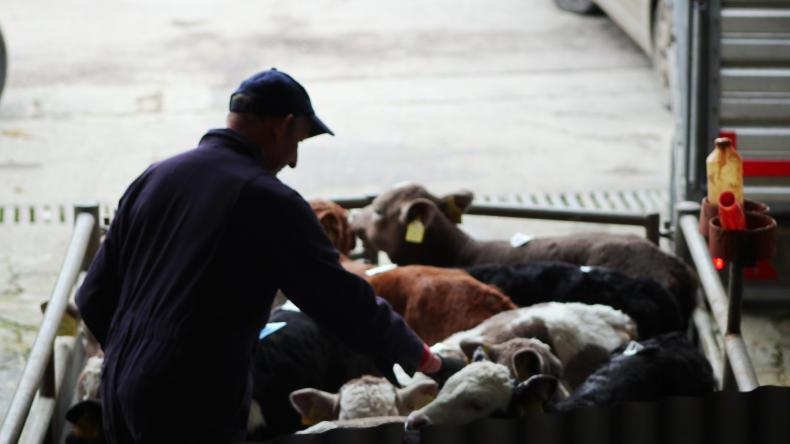
A farmer numbering his calves ahead of the sale.
For some, like Ballinascarthy dairy farmer Ivor Bateman, selling calves was a necessity.
I'm getting as many as I can away now, because I feel that within a week there might be no more marts
Speaking to the Irish Farmers Journal after dropping in his second load of calves, he said: "I was locked up with TB up till last Friday, so I'm getting as many as I can away now, because I feel that within a week there might be no more marts and I just don't have the capacity to keep them plus the expense of keeping them. It will take the pressure off."
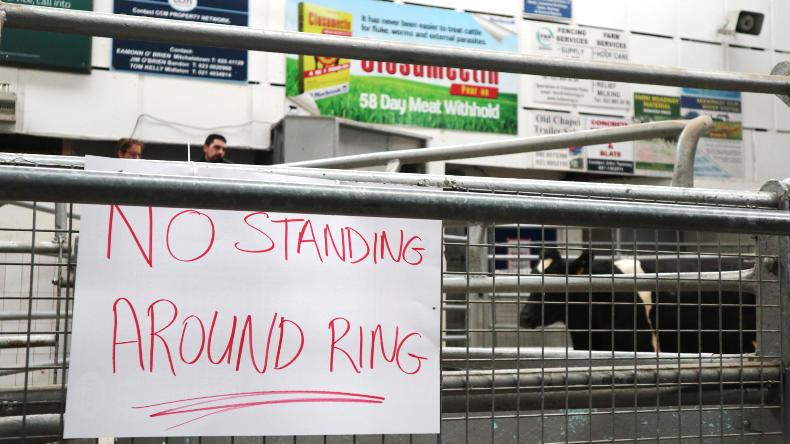
Patrons were asked to refrain from leaning on the rails as part of the measures marts are adhering to.
He had no issues with the current restrictions.
"I think the measures are excellent. They have to be. You have to isolate people from each other and hope you're not deterring buyers. You have to limit people in groups and it's a good idea."
Buyers only
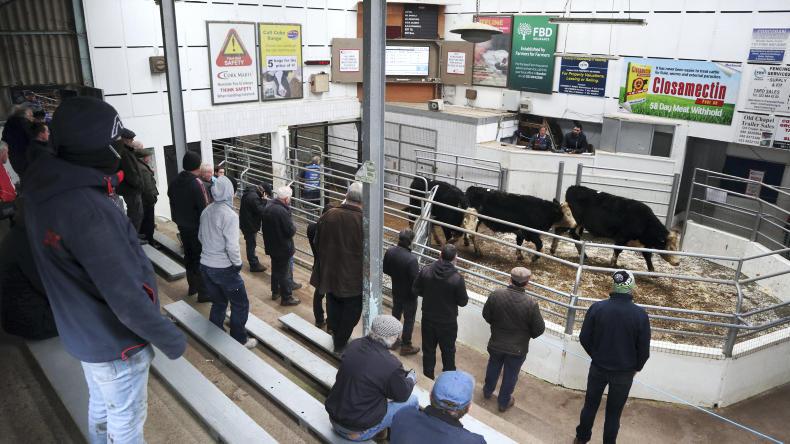
Nowhere to hide for bidders this week.
The terms buyers' mart or sellers' mart is often bandied about when describing sales but in the last week these terms have taken on more meaning.

Buyers were asked to keep their distance when in the sales ring.
In both rings, only buyers were permitted to be ringside. Sellers had a designated area to access the sellers' box and were encouraged to maintain distance from the auctioneers.
For those selling calves, this was in the open air and the rain held off.
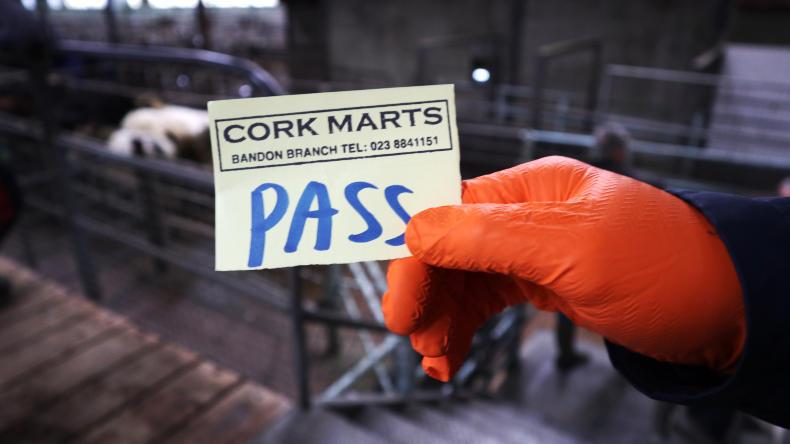
Only prospective buyers were permitted to access the sales rings, each was given a ticket on entry which they handed back when leaving.
While many buyers at marts lean on the rails and are invited to 'stand on' when it comes to bids, in Bandon with the ringside railings cordoned off it was a case of stand back or stand up.
In some cases, you could have rolled a round bale between some people while they were conversing
While it may put out some mart patrons, these measures are necessary in the current climate.
Some adapted better than others. The catwalks were near deserted, the pens were a sea of calves and, in some cases, you could have rolled a round bale between some people while they were conversing.

Buyers at the bullock sale in Bandon. The ringside was cordoned off and buyers were asked to spread out.
Added workload
Spring is always a busy time for mart manager Tom McCarthy, but there's an added workload in managing the premises to ensure farmers can trade.
Speaking after the sale, he said: "We're trying to keep the business going as much as we can, because we understand this is the time of year when most pressure is on farmers both physically and financially.
"We're trying our best to keep open and we're appealing to farmers and the general public to work with us," he said.
"This time last year, we had 1,800 or 1,900 calves and we're a little above that now.
"As long as the boats will stay going and we can move on the Friesian bull calves in particular. The trade isn't so bad.

The railings were quieter at the dry cow sale.
"A good Friesian bull is fine. Angus and whiteheads are much the same as they were last week. It's the lighter, poorer-quality calf [that] will suffer in times like these."
Calves
With 2,000 calves on offer for the second week in a row and prevailing trading conditions, calf prices remained steady.
Export Friesian bull calves sold from €15 to €75, with farmers paying up to €165 for the stronger calf.

Continental calves made up to €360 this week.
Traditional beef-cross bull calves mainly sold for between €110 and €245, while heifer prices went €30 either side of the bull calf price bracket. As ever, demand aas strong for the bit of colour, with continental calves making up to €360.
Our position is we're going to go on a day-by-day basis and implement the recommendations from ICOS

Calf sellers had to wait their turn to sell outside the calf ring. Some found vantage points to see when their calves were coming up.
Regarding future sales for the southern mart co-operative, Cork Marts CEO Sean O'Sullivan said: "Our position is we're going to go on a day-by-day basis and implement the recommendations from ICOS.
"For now, there will be a sale in Cahir on Wednesday and there will be sales in Bandon and Corrin on Thursday. We'll be making a call on next Friday's Skibbereen sale on Wednesday.
"We've had a number of sales since the restrictions came in and we may have to look at further restricting the numbers going into the sales ring.
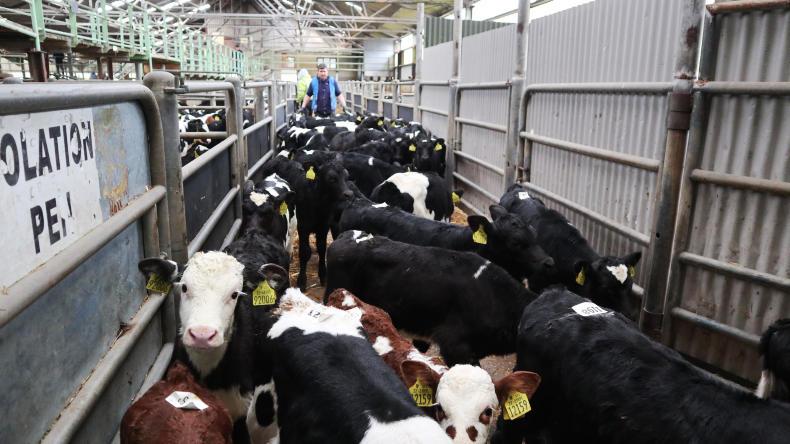
Calves on the move.
"We will be limiting numbers based on the physical size of the rings. There is a willingness among everyone to work through this."
Even the drive in towards the mart is uncertain, as the situation concerning the Covid-19 virus seems to change by the hour.
For the most part, farmers are adapting well to the changes, but, at the same, time there was a good proportion of wondering how long marts would remain open.

A sellers eye view of proceedings.
Former Carbery group chair Johnny O'Brien was one of those selling and he urged farmers to support each other where possible at this time.
"The important thing is that everyone supports one another. If marts close, that could cause its own problems from an animal welfare perspective. People need to be careful and look out for one another."
Concern
In the lead-up to the sale, there was a small bit of concern that there would be extra calves at the sale, but numbers were the same as last week.

A farmer numbering his calves ahead of the sale.
For some, like Ballinascarthy dairy farmer Ivor Bateman, selling calves was a necessity.
I'm getting as many as I can away now, because I feel that within a week there might be no more marts
Speaking to the Irish Farmers Journal after dropping in his second load of calves, he said: "I was locked up with TB up till last Friday, so I'm getting as many as I can away now, because I feel that within a week there might be no more marts and I just don't have the capacity to keep them plus the expense of keeping them. It will take the pressure off."

Patrons were asked to refrain from leaning on the rails as part of the measures marts are adhering to.
He had no issues with the current restrictions.
"I think the measures are excellent. They have to be. You have to isolate people from each other and hope you're not deterring buyers. You have to limit people in groups and it's a good idea."
Buyers only

Nowhere to hide for bidders this week.
The terms buyers' mart or sellers' mart is often bandied about when describing sales but in the last week these terms have taken on more meaning.

Buyers were asked to keep their distance when in the sales ring.
In both rings, only buyers were permitted to be ringside. Sellers had a designated area to access the sellers' box and were encouraged to maintain distance from the auctioneers.
For those selling calves, this was in the open air and the rain held off.

Only prospective buyers were permitted to access the sales rings, each was given a ticket on entry which they handed back when leaving.
While many buyers at marts lean on the rails and are invited to 'stand on' when it comes to bids, in Bandon with the ringside railings cordoned off it was a case of stand back or stand up.
In some cases, you could have rolled a round bale between some people while they were conversing
While it may put out some mart patrons, these measures are necessary in the current climate.
Some adapted better than others. The catwalks were near deserted, the pens were a sea of calves and, in some cases, you could have rolled a round bale between some people while they were conversing.

Buyers at the bullock sale in Bandon. The ringside was cordoned off and buyers were asked to spread out.
Added workload
Spring is always a busy time for mart manager Tom McCarthy, but there's an added workload in managing the premises to ensure farmers can trade.
Speaking after the sale, he said: "We're trying to keep the business going as much as we can, because we understand this is the time of year when most pressure is on farmers both physically and financially.
"We're trying our best to keep open and we're appealing to farmers and the general public to work with us," he said.
"This time last year, we had 1,800 or 1,900 calves and we're a little above that now.
"As long as the boats will stay going and we can move on the Friesian bull calves in particular. The trade isn't so bad.

The railings were quieter at the dry cow sale.
"A good Friesian bull is fine. Angus and whiteheads are much the same as they were last week. It's the lighter, poorer-quality calf [that] will suffer in times like these."
Calves
With 2,000 calves on offer for the second week in a row and prevailing trading conditions, calf prices remained steady.
Export Friesian bull calves sold from €15 to €75, with farmers paying up to €165 for the stronger calf.

Continental calves made up to €360 this week.
Traditional beef-cross bull calves mainly sold for between €110 and €245, while heifer prices went €30 either side of the bull calf price bracket. As ever, demand aas strong for the bit of colour, with continental calves making up to €360.
Our position is we're going to go on a day-by-day basis and implement the recommendations from ICOS

Calf sellers had to wait their turn to sell outside the calf ring. Some found vantage points to see when their calves were coming up.
Regarding future sales for the southern mart co-operative, Cork Marts CEO Sean O'Sullivan said: "Our position is we're going to go on a day-by-day basis and implement the recommendations from ICOS.
"For now, there will be a sale in Cahir on Wednesday and there will be sales in Bandon and Corrin on Thursday. We'll be making a call on next Friday's Skibbereen sale on Wednesday.
"We've had a number of sales since the restrictions came in and we may have to look at further restricting the numbers going into the sales ring.

Calves on the move.
"We will be limiting numbers based on the physical size of the rings. There is a willingness among everyone to work through this."















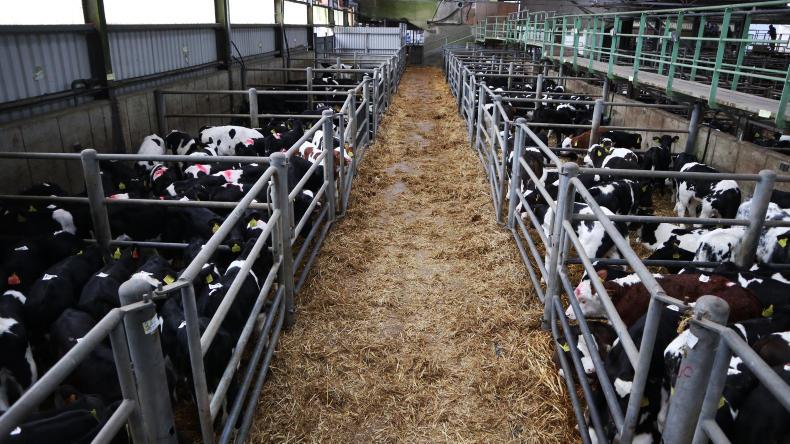

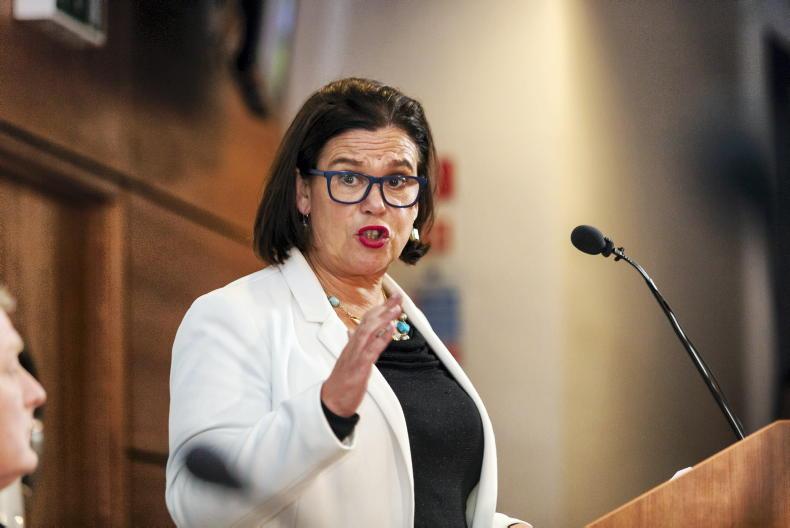
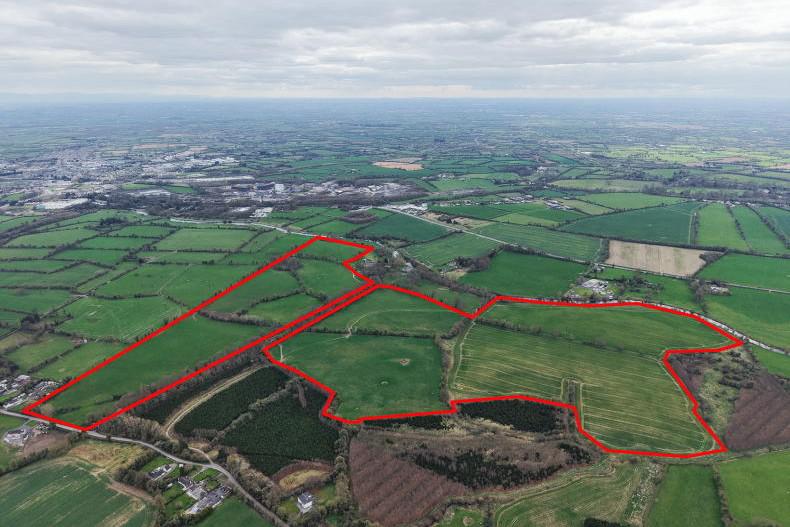
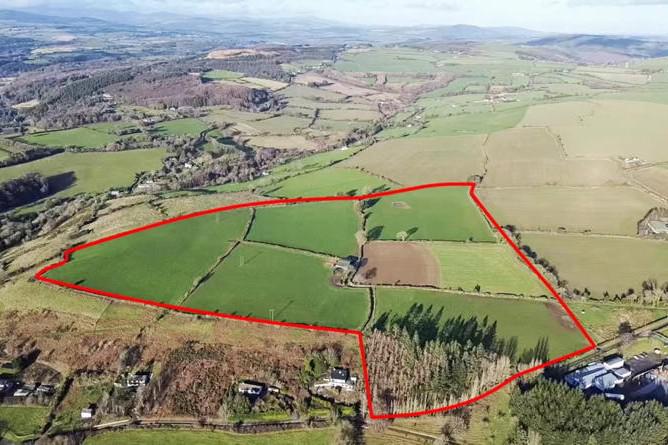
SHARING OPTIONS